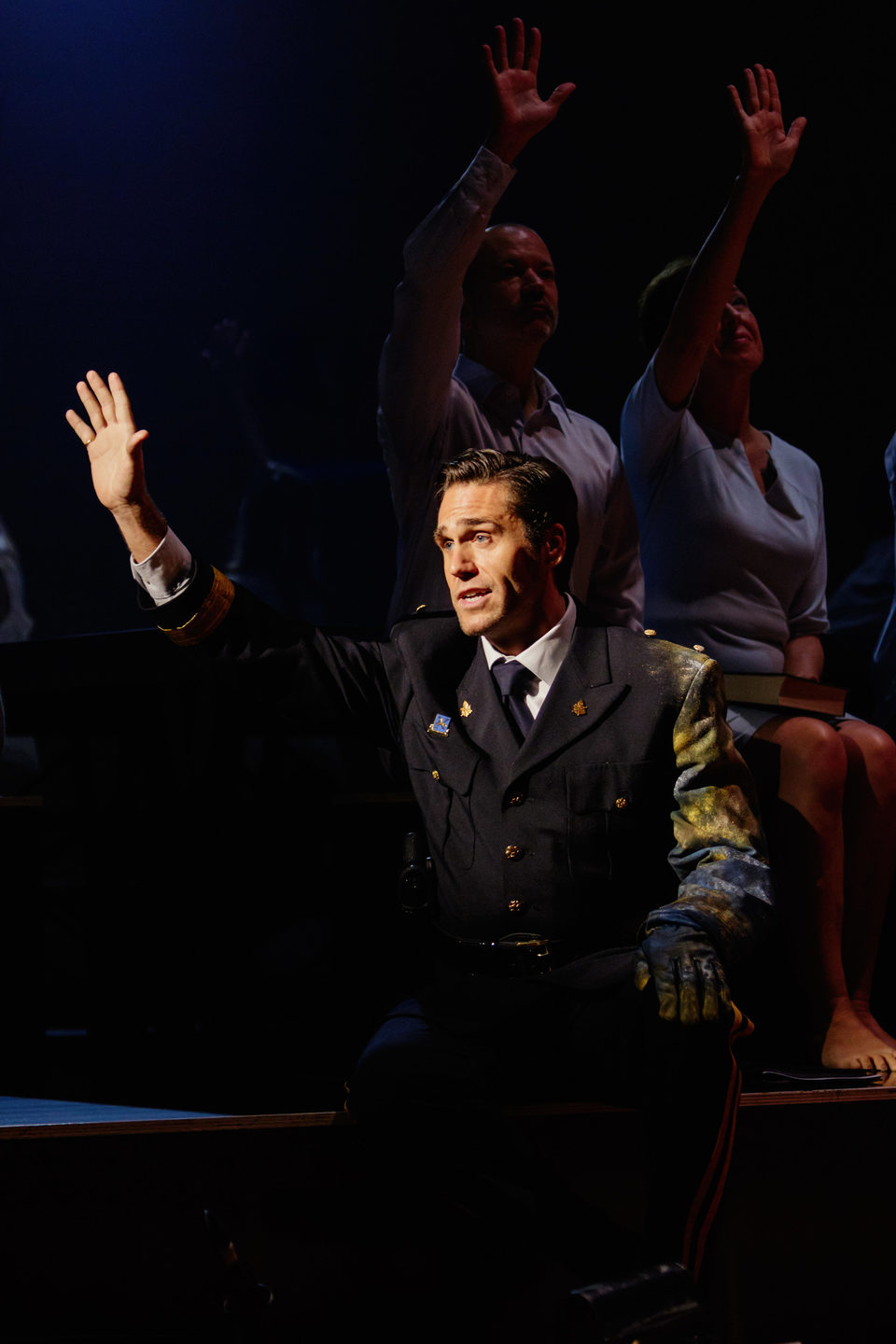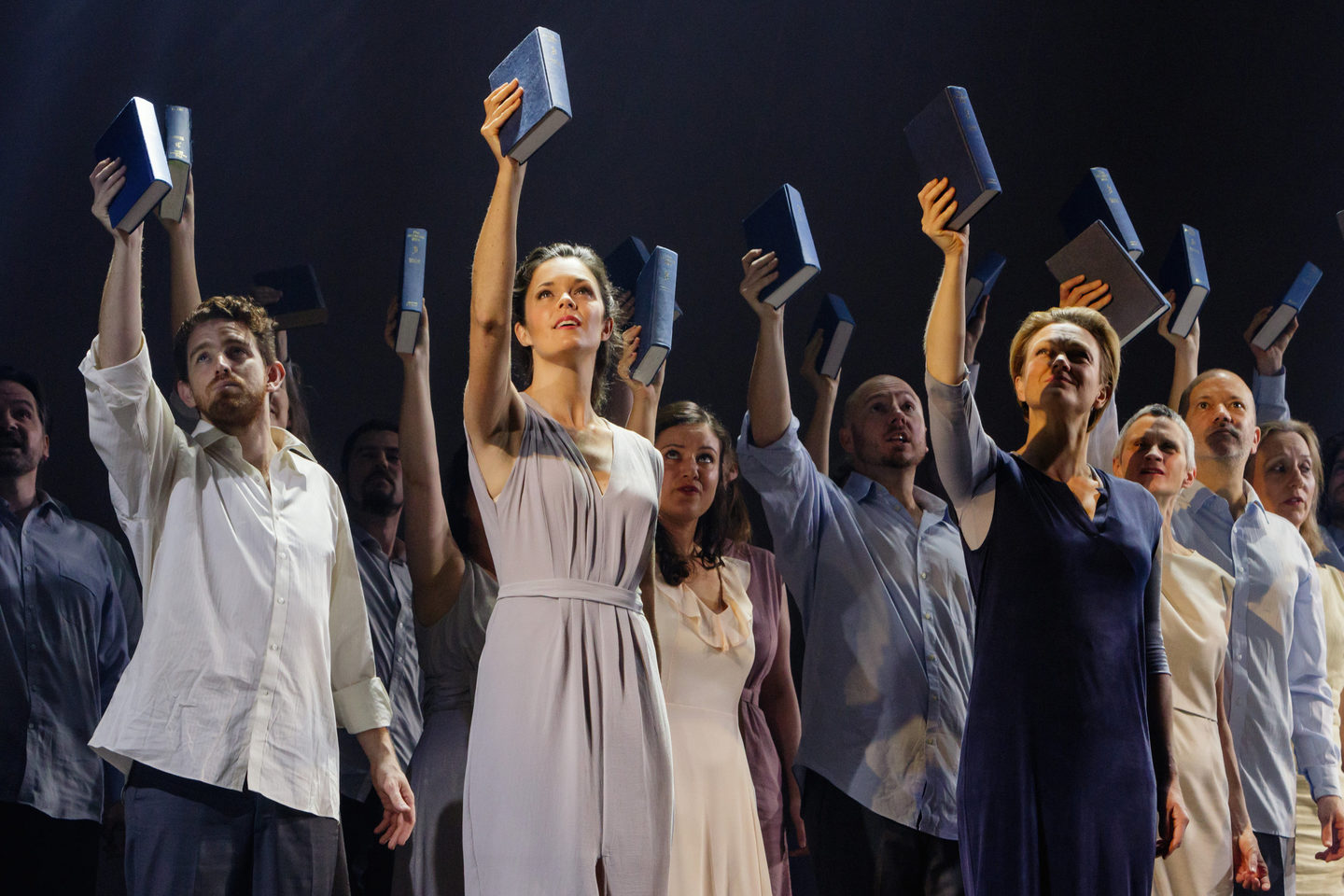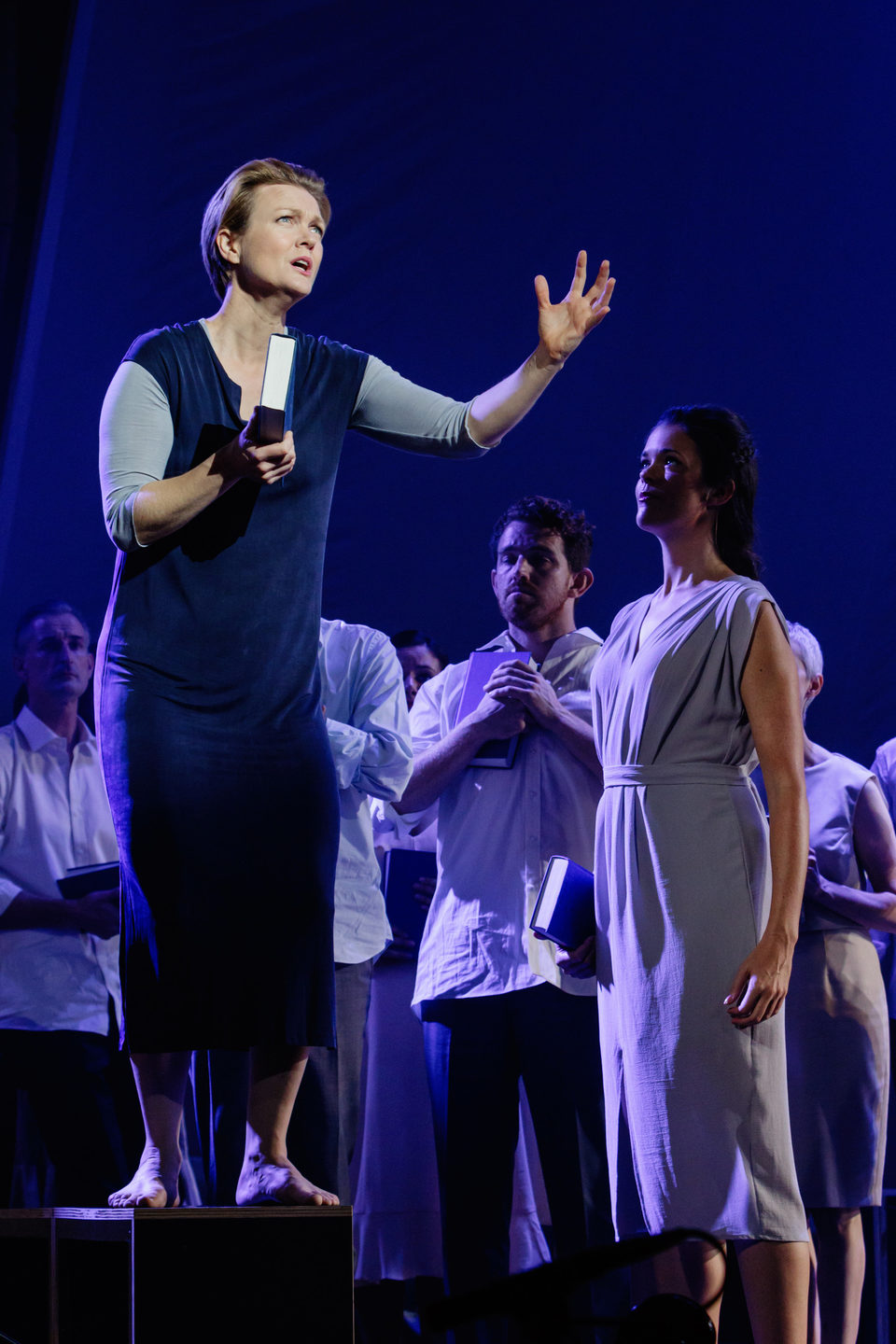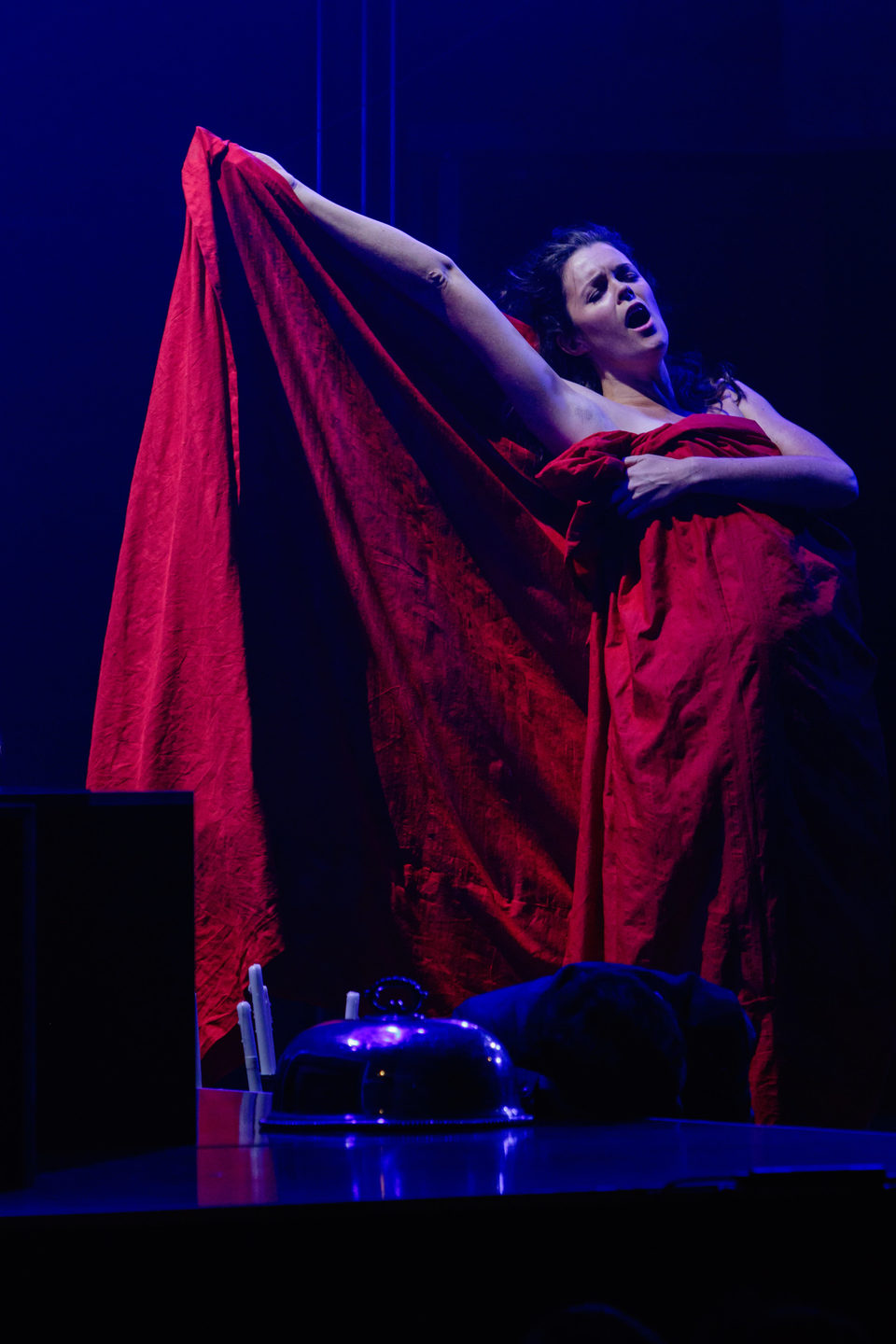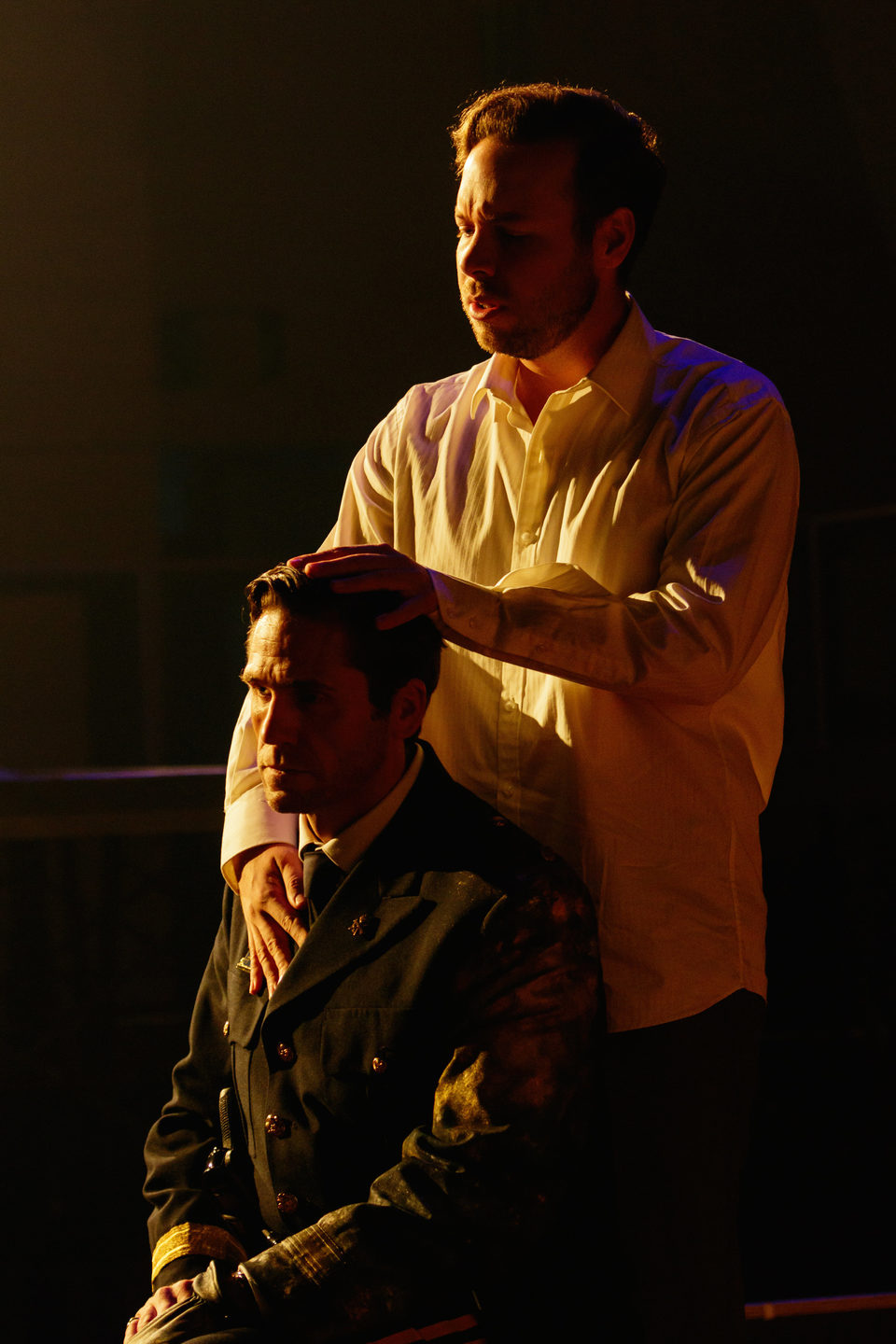Theodora
libretto by Thomas Morrell
Theodora was first performed 16 March 1750 at Covent Garden Theatre. In English with surtitles
Wed 30 Nov 7pm | Thurs 1 Dec 7pm | Sat 3 Dec 7pm | Sun 4 Dec 5pm | Tues 6 Dec 7pm 2016
City Recital Hall Sydney
Handel's Theodora
Handel's second last oratorio and favourite work, Theodora has come to be recognised in the last twenty years as Handel's masterpiece. A succession of the most beautiful arias and choruses, Theodora is a profoundly moving experience.
Theodora is a tale from ancient Rome that speaks to our hearts, here and now. Innocence, love, faith and courage bloom strong and full of promise, only to be struck down by blind hatred and the thirst for power.
REVIEWS
READ
1] George Fredrick Handel
Born in the German town of Halle in 1685, Handel studied briefly at the University of Halle before moving to Hamburg in 1703, where he served as a violinist in the opera orchestra and subsequently as harpsichordist and composer. From 1706 to 1710 he was in Italy, where he further developed his mastery of Italian musical style. Appointed Kapellmeister to the Elector of Hanover, the future George I of England, he visited London, where he composed the first London Italian opera, Rinaldo, in 1710 and settled two years later.
He enjoyed aristocratic and later royal patronage, and was occupied largely with the composition of Italian opera with varying financial success until the 1740s. He was successful in developing a new form, the English oratorio, which combined the musical felicities of the Italian operatic style with an increased role for the chorus, relative economy of production, and the satisfaction of an English and religious text (elements that appealed to English Protestant sensibilities). In London he won the greatest esteem and exercised an influence that tended to overshadow the achievements of his contemporaries and immediate successors. He died in London in 1759 and was buried in Westminster Abbey in the presence of some 3,000 mourners.
2] The Story
The scene is set in 4th century Antioch, which is occupied by the Roman army.
Act 1
Valens, the Roman governor, proclaims that in celebration of the Emperor birthday all cititzens must make sacrifice to Jove and join in a feast to the Emperor's honour. Those who refuse to participate will be punished or executed. He charges Septimius with carrying out his orders. Didymus, a Roman soldier, asks that those whose conscience forbids them from particpating be protected from punishment.
But Valens is unbending and questions the soldier's loyalty to Rome. Didymus turns now to Septimius with the same argument. Septimius suspects that Didymus is secretly a Christian, and admits that he too would prefer to show mercy to those who refuse to celebrate. However, he is a loyal Roman and will carry out his orders.
In the Christian community, Theodora and Irene are praying. A messenger arrives and warns them of Valens's commands. But Irene leads the community in a reaffirmation of their faith. Septimius arrives and warns them of the punishment they face - a punishment Theodora is happy to embrace. However, rather than have her executed Septimius takes her away to a brothel where she will be prostituted to the Roman soldiers.
Didymus arrives too late to save her, and sets out to release her. The chorus pray to heaven for his success.
Act II
The Romans proceed with their celebrations. Valens sends Septimius to Theodora with an offer of clemency if she makes a sacrifice before sunset.
In her prison cell, Theodora waits fearfully for her fate. But contemplation of the heaven that awaits her after death cheers her spirits. Didymus persuades Septimius to let him enter Theodora's cell and rescue her, as Irene prays that God will protect Theodora.
Didymus enters the cell and finds Theodora asleep. She wakes with a start fearing the worse, but Didymus reveals his identity and calms her. She begs him to kill her but he cannot. Instead he dresses her in his uniform and, disguised as a soldier, Theodora escapes the cell leaving Didymus in her place.
The Christians maintian a vigil, led by Irene.
Act III
Still praying for Theodora's release, Irene is surprised to see her companion arrive dressed in Didymus's clothes. The Christians celebrate her safe return, though Theodora herself is concerned for the safety of Didymus.
A messenger arrives to tell them that Didymus has been sentenced to death, and that Theodora is now too condemned to die if she is caught. Despite Irene's efforts to restrain her, Theodora rushes to the Roman court to offer herself in place of Didymus.
Valens condemns Didymus to death as Theodora arrives to save him. Both offer to die in place of the other, but Valens will not let them bargain with their own fates and sends both of them to execution. As they blissfully enter immortality together the Christian community join in a hymn of praise.
3] The Music
Theodora begins with an ‘Ouverture’ in the French style in G minor and ends with a chorus in the same key, which is associated throughout the work with the Christians and Theodora herself, as is the restrained scoring for oboes and strings (with telling use of a solo flute in Theodora’s prison scene).
In the music for the Romans, however, Handel adds the extra colours of trumpets, drums and horns, echoing his characterisation of ‘heathens’ in other oratorios, as more hedonistic than vicious. As is often the case, he sometimes makes use of pre-existing musical material by other composers, but invariably transforms it in subtle and inventive ways. Several numbers in Theodora are based on themes from the vocal duets of the Pisan composer Giovanni Carlo Maria Clari (1677–1754). Their abnormal intervals or combinations of rhythmically diverse fragments helped Handel to generate unconventional musical textures, especially useful for suggesting the other-worldly outlook of the alienated Christian community. A theme by Clari is also the basis of the most remarkable of the Roman choruses, ‘How strange their ends’, where the Romans express their bafflement at the willingness of Theodora and Didymus to die for each other.
The most famous aria in Theodora is probably ‘Angels, ever bright and fair’, Theodora’s radiant prayer to be spared the threat of rape and to enter Heaven as a virgin, but many arias of great tenderness are to be found in the oratorio, especially in the mezzo-soprano role of Irene, whose ‘As with rosy steps the morn advancing’ has become almost equally well-known. The arias of both Didymus and Septimius share this quality, though the latter, as befits a Roman officer, has one vigorous number (‘Dread the fruits of Christian folly’). Handel makes a clear contrast between their numbers and the combination of military swagger and menace in Valens’s music. Each of the three parts ends with a chorus of exceptional beauty. Handel himself is said to have had special affection for the one concluding Part 2 (‘He saw the lovely youth’). When asked if he regarded the Hallelujah Chorus of Messiah as his masterpiece, he replied (according to the letter of Morell mentioned above): ‘No ... I think the Chorus at the end of the 2nd part in Theodora far beyond it’.
4] Handel and Theodora
Handel was still showing remarkable creative abilitites when he completed Theodora in his 65th year. This would prove to be his penultimate major work, and it would be a further two years before he produced his final great oratorio, Jephtha.
The omens for Theodora were not good. A week before the first performance on 16th March 1750 London experienced an unprecendented earthquake. Eighty years after the event a witness decribed what had occured:
'On the 8th of March, 1750, an earthquake shook London. The shock was at half past five in the morning. It awoke peoplefrom their sleep and frightened them out of their houses. A servant maid in Charterhouse-square, was thrown from her bed, and had her arm broken; bells in several steeples were struck by the chime hammers; great stones were thrown from the new spire of Westminster Abbey; dogs howled in uncommon tones; and fish jumped half a yard above the water.'
Many people fled London in panic, and were still absent when Handel opened his season a few days later. This would account in part for the small attendance at the three performances given of Theodora that season.
Handel was also concerned about the audience the Christian story with a tragic ending could attract. When told that one of his supporters wanted to buy all the boxes for a particular performance, Handel was heard to comment: 'He is a fool; the Jews will not come to it (as to Judas) because it is a Christian story; and the Ladies will not come because it is a virtuous one’. London's Jewish community had welcomed Handel's 1747 oratorio Judas Maccabaeus, which he had written in celebration of the Duke of Cumberland's victory over the Jacobites at Culloden, and which was also based on a libretto byThomas Morell.
Handel was disappointed by the poor reception given to Theodora. When asked by some musicians for free tickets for a performance of Messiah, Handel's response (recorded by Charles Burney) gives an indication of his bitter feelings: 'Oh your servant, meine Herren! you are damnable dainty! you would not go to Theodora - there was room enough to dance there, when that was perform'.
The first cast of Theodora included the alto-castrato Gaetano Guadagni, for whom Handel wrote the role of Didymus. It was unusual for Handel to include a castrato voice in his English oratorios, but Guadagni had already appeared with great success in performances of Messiah and Samson, for which Handel had adapted the roles originally sung by Susannah Cibber. In 1762 Guadagni would create the title role in Gluck's Orfeo in Vienna.
Some years after Handel's death, Morell remembered working with him on a number of oratorios. He had a particular memory of Theodora:
'The next I wrote was 'Theodora' (in 1749), which Mr. Handell himself valued more than any Performance of the kind; and when I once ask'd him, whether he did not look upon the Grand Chorus in the Messiah as his Master Piece? "No", says he, "I think the Chorus at the end of the 2nd part in Theodora far beyond it. He saw the lovely youth" '.
Despite his affection for the work, Handel never revived Theodora.
5] Composition and Performances
According to the dates entered on his autograph score, Handel began composing Theodora on 28 June 1749 and finished drafting all three parts on 17 July. The score was revised and the orchestration completed on 31 July, and the work was first performed at Covent Garden Theatre on 16 March 1750. The original singers were Giulia Frasi (Theodora), Caterina Galli (Irene), the alto castrato Gaetano Guadagni (Didymus), Thomas Lowe (Septimius) and Henry Reinhold (Valens).
Handel’s friends recognised the merits of the work, with the Earl of Shaftesbury declaring it to be ‘as finished, beautifull and labour’d a composition, as ever Handel made’. (‘Labour’d’ here means ‘carefully constructed’.) This was, however, a minority opinion: the work was not liked by the wider public, though revivals of earlier oratorios in the same season were well received. The only explanation of its failure found in contemporary documents is Handel’s own sardonic comment, recorded by Morell: ‘The Jews will not come to it (as to Judas) because it is a Christian story; and the Ladies will not come, because it [is] a virtuous one’. It is more likely that the tragic ending was the main problem. Handel made several cuts to the score, and revived the work only once, in 1755. (A further revival planned for 1759 was cancelled because of his death.) Regrettably, many of the cuts made by Handel and others in the recitatives were perpetuated in the published scores of the work and significantly affected its reputation, since they obscured the story and in a few places resulted in verbal nonsense. It was not until 1985, when Novello published a new edition by Watkins Shaw, that a complete score of Theodora became widely accessible. Recent recordings and performances (notably Peter Sellars’s 1996 stage production for Glyndebourne, with the late Lorraine Hunt Lieberson as Irene) have finally won for Handel’s most extraordinary oratorio the respect and admiration it deserves.
6] The Libretto
For the oratorio Judas Maccabeus Handel used (at the suggestion of the Prince of Wales) a new librettist, the Revd. Thomas Morell (1703–84). The following year Morell supplied the libretto for another oratorio, Alexander Balus, and Handel returned to him for his last two wholly original oratorios, Theodora (first performed in 1750) and Jephtha (1752).
With Theodora, the tale of two early Christian martyrs, Morell moved into new territory for English oratorio. Theodora is the only one of Handel’s dramatic oratorios with a specifically Christian story (as opposed to the Jewish stories of the Old Testament, or the non-dramatic Messiah), and the only one with a story not derived from the Bible or the Apocrypha. Morell’s main source was the religious novel The Martyrdom of Theodora and of Didymus by the Hon. Robert Boyle (1627–91), now mainly remembered for his pioneer work in physics and chemistry.
The Martyrdom was published in 1687, but only as ‘Book II’ of a work of which the first half had become lost. An earlier manuscript draft of a complete version exists, however, and (as the Handel scholar Ruth Smith has recently pointed out) Morell may have known it, since it appears to supply some details used by Morell but not present in the published version. Boyle’s own sources for the story seem to have been an account of two unnamed martyrs given in Book 2 of St. Ambrose’s De virginibus, set in Antioch, and a similar story found in a number of early martyrologies, where the central characters are named but the story is set in Alexandria. Boyle was also influenced by Pierre Corneille’s verse tragedy Théodore, vierge et martyre, published in 1646, where the setting is again Antioch and where Theodora is given royal status as a ‘daughter of Antiochus’, i.e. a descendant of the kings of Syria. The latter detail is adopted by Boyle but is not in the earlier versions of the story.
Morell picked up the connection with Corneille’s play, from which he took the name of Valens for the ‘President’ (i.e. prefect or governor) of Antioch, but did not use any details of its plot. Instead he invented the whole of Part 1 and the first two scenes of Part 2 of the libretto on the basis of the brief summary provided by Boyle of the missing section of the book (possibly with the help of the manuscript draft), and then rigorously condensed Boyle’s discursive narrative for the rest. The result was one of the most effective oratorio librettos ever offered to Handel, and was duly recognised as such by the composer himself. In a letter written around 1780 Morell recorded that Handel valued the libretto ‘more than any Performance of the Kind’. Following the precedent of many earlier librettos for Handel, Morell creates two sets of characters defined by their beliefs, here Christians and Romans (the latter somewhat prejudicially called ‘Heathens’), and provides choruses for each group. The story is swiftly set in motion by the announcement of Valens’s decree in the opening scene, and unfolds at a steady pace to the tragic, though not despondent, climax.

ARTIST INFORMATION
Valda Wilson Theodora
Caitlin Hulcup Irene
Christopher Lowrey Didymus
Ed Lyon Septimius
Andrew Collis Valens
Cantillation Chorus
Orchestra of the Antipodes
Erin Helyard, conductor
Lindy Hume, director
Dan Potra, designer
Matthew Marshall, lighting designer
Sally Blackwood, assistant director
Keiren Brandt-Sawdy, assistant conductor
LISTEN
Theodora has many achingly beautiful arias and choruses. Perhaps the best known is "Angels ever bright and fair". Listen to Lorraine Hunt Lieberson sing this divinely beautiful piece:
As a result of the famed Glyndebourne production "As with rosy steps the dawn advances" has also become very famous.
WATCH
Gallery
We acknowledge the traditional owners of the land on which we work and perform, the Gadigal people of the Eora nation – the first storytellers and singers of songs.
We pay our respects to their elders past and present.
CONTACT
PO Box 291, Strawberry Hills, NSW, 2012, Australia
Ticketing and Customer Service 02 9037 3444
ticketing@pinchgutopera.com.au
info@pinchgutopera.com.au

© COPYRIGHT 2002 - 2024 PINCHGUT OPERA LTD | Privacy Policy | Accessibility | Website with MOBLE





